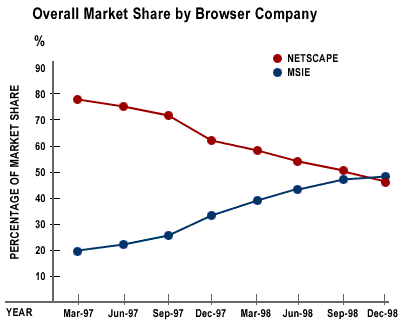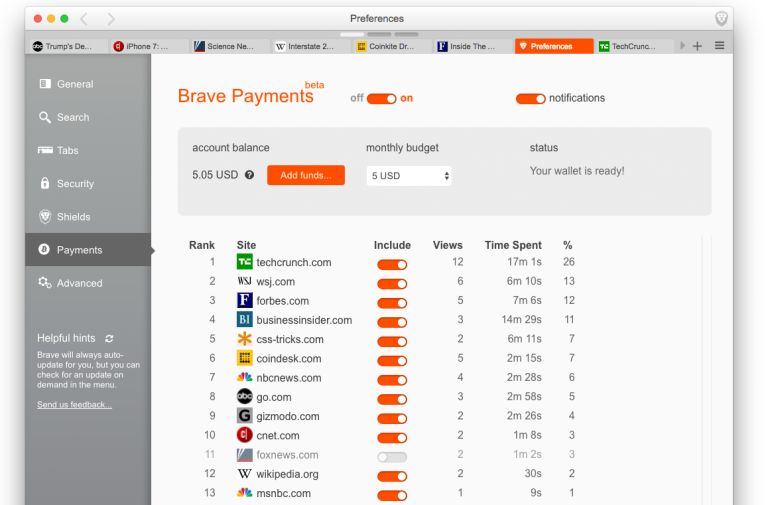A person. As the creator of JavaScript, Brendan Ike came to the creation of his company

Brendan Ike is not the most famous character. This is partly due to his modesty, partly - the specifics of the work. But his contribution to the IT industry is large enough to let millions know about him. We can say that he himself is great.
Ike still continues to create something new. A recent example is its “anti-advertising” browser, which was met with contradictory, but by no means indifferent.
')
Brendan Ike was born on July 4, 1961 in Pittsburgh, Pennsylvania. Ike graduated from the University in Santa Clara County, receiving a bachelor's degree. In 1986, he graduated from the University of Illinois at Urbana-Champaign, where he received a master's degree.
Brendan Ike began his career at Silicon Graphics, a company specializing in the production of graphic terminals. He worked in the company for 7 years, after which he moved to MicroUnity Systems Engineering.
 After 3 years, in April 1995, Brendan began working at Netscape. He was faced with the task of introducing a programming language similar to Scheme into the Netscape Navigator browser.
After 3 years, in April 1995, Brendan began working at Netscape. He was faced with the task of introducing a programming language similar to Scheme into the Netscape Navigator browser.However, the statement of the problem was, to put it mildly, not too accurate, and Ike was transferred to the group responsible for server products, where he worked for a month, working on improving the HTTP protocol.
Javascript
In May, the developer was transferred back to the client-side team (browser), where he immediately began to develop the concept of a new programming language.
After a while, a scripting language called LiveScript appeared. It was created to implement interactivity in HTML documents that were static before. LiveScript support was implemented in the first versions of the Netscape Navigator browser, and was very popular and successful.

As a result of the agreement between Netscape Communications and Sun Microsystems and the unification of LiveScript ideas with the Java structure, an environment called “Mocha” appeared, designed to develop network applications and, ultimately, to create dynamic web pages. The medium was released as open source software and was independent of the software platform used.
The project ended with the creation of specifications that were published by the two companies in December 1995 under the name JavaScript 1.0.
It cannot be said that Brendan Ike alone created this language, but the authorship and concept undoubtedly belong to Brendan. However, with his characteristic modesty, Ike says that he was only a member of the team. This allows you to make certain conclusions about his character: he is a "techie" who does his job and does not like to stick out. Moreover, this partly explains why he did not hold high positions in companies for a long time.
Mozilla
However, after three years, Netscape, along with its browser, began to move toward failure. Microsoft Internet Explorer 4 has become a new market leader due to better support for HTML 4, CSS, DOM and ECMAScript. In November 1998, work on the Netscape 5.0 browser was discontinued, the developers decided to write an absolutely new software from scratch.

The new source code was named Mozilla, on the basis of which Netscape 6 was created with minor changes.
In January 1998, Netscape decided to develop a browser in an open source project. An informal group was created by the Mozilla Organization, which was mainly funded by Netscape.
Brendan Ike immediately took a prominent position in the community. When AOL closed its Netscape division in July 2003, it remained at the Mozilla Foundation.
In August 2005, after working as a chief technologist and a member of the board of directors of the Mozilla Foundation, Brendan became the technical director of the Mozilla Corporation formed by that time, and on March 26, 2014 he was appointed general director.
Ike's strategy
The main competitor of the Mozilla Firefox browser was Google Chrome. Brendan Ike had a clear plan of action - it was necessary to level the strengths of Chrome and hit the weaknesses of Google. In his opinion, Chrome is strong in two technologies - an insulating multi-process architecture that separates tabs, extensions, windows and plug-ins across various processes, increasing their stability and security; as well as a browser-integrated Adobe Flash Player module at the level of a secure PPAPI module.

That is why Ike considered it necessary to focus on the development of projects Electrolysis and Shumway.
The first project was designed for the implementation of a multiprocess architecture with a further implementation of the sandbox. However, this led to incompatibility with the platform of add-ons and extensions, so the implementation of Electrolysis was postponed indefinitely.According to Brendan Ike, without the implementation of Electrolysis and Shumway, Firefox cannot compete with Chrome. And the opinion of an expert of this level at least deserves the attention and respect, it would seem. But…
Shumway, an open source project designed to reproduce Flash-format SWF using standardized technologies HTML5 and JavaScript, also encountered difficulties. On the one hand, its development is continued by community forces and some Mozilla employees, but the main development under the leadership of project management has ceased, therefore its fate is in question.
As one of the weaknesses of Google, Ike mentioned privacy issues. After high-profile stories with Julian Assange and Edward Snowden, who exposed the actions of the security services to intercept private information on the Internet, ordinary users also became interested in protecting personal data.
Chrome is closely connected with Google services, and even with all the data transfer options to the company disabled, it can create a basic, unique web user fingerprint.But unfortunately, the moment was missed, and Mozilla could not use this circumstance with the maximum benefit.
Many experts agreed with Brendan Ike and also noted a temporary decline in the market share of the Chrome browser - it was hard to come up with a more favorable moment for the “overtaking”. Well, when the hype around the leakage of personal data subsided, Chrome began to recover its position.
In 2014, after Ike was gone, Mozilla was in an ambiguous position: the Firefox browser continued to compete with Chrome, but 90% of its budget Mozilla Corporation receives from the contract with Google, which paid for using its default search in Firefox. As a result, the proportion of Mozilla Firefox has dropped even more - from 18% to 15.5%.
For ideological reasons
In April 2014, Mozilla CEO Brendan Ike announced his resignation. Ike served as head of Mozilla for less than two weeks. His departure was not planned. The fact is that some details of his past have become known.
Outraged public demanded the resignation, almost equating Brendan Aik's long-standing deed to the crime.
In 2008, Ike allocated from his personal funds $ 1 thousand in support of an amendment to California law, known as "Proposition 8". This amendment defined marriage as a “union between a man and a woman”. The amendment was accepted, but in 2013 it was canceled by the US Supreme Court.
That is, he spent a rather modest amount of money to support the bill, which was canceled three years ago.

In order, for example, in the USSR to successfully move up the career ladder, it was necessary to have a good “characteristic”, which, in particular, would designate a person as a reliable supporter of the only true Marxist-Leninist teaching. “Bleed characteristic” - that is, to get a record of “moral instability” - was a serious threat. Now the United States is actually moving to this late Soviet practice.
“Mozilla has clearly defined its hiring policy: no Catholics, no Protestants, no Orthodox, no Muslims, no Jews, no Mormons - unless you are a“ correct ”type of believers. Those who believe that their religious and philosophical traditions, which regard marriage as a union of a man and a woman, are false, and the views of the modern liberal elite are true, ” writes American commentator Robert George.
As in the late USSR, a person who wants to make a career must express his loyalty to the dominant ideology.
The similarities between gender and communist ideologies cannot be overlooked, writes Sergey Khudiyev. Both are "progressive" and claim their inevitable historical victory. Both are totalitarian, that is, they equate disagreement with a crime. Both begin to pursue dissenters as soon as they get this opportunity.
Any totalitarian movement needs enemies - and provides unity of supporters at the expense of their persecution. To get on the list of enemies is very easy - for example, as we see in this case, to give some money in support of a bill that the liberals do not like. To ask what kind of equality and inclusiveness there is, when a person is forced to leave because of his ideologically incorrect views, is meaningless within the framework of liberal discourse, Khudiyev concludes.
By the way, Brendan himself is married to a woman named Eleanor. They have joint children.
Be brave
In January 2016, Ike announced the launch of the new open source browser Brave, the distinguishing feature of which is blocking ads out of the box, as well as protecting the privacy of users.
For the implementation of this project, Ike and his team received a $ 2.5 million investment. In August, Brave browser developers managed to attract additional investments totaling $ 4.5 million.
Brave is based on the Electron platform, which, in turn, is based on the Chromium and Node.js engine. The creators of Brave say that the browser works faster than its competitors by 1.5-4 times. Such results were achieved not only by cutting out advertising from sites, but also by removing from the pages the numerous tracking codes that infect any website that supports advertising.
In September, Brave gave users the opportunity to make micropayments. “Users can already replenish wallets associated with anonymous identifiers in the Brave browser, and automatically make micropayments in favor of their favorite sites,” said Brain Software founder and CEO Brendan Aik, quoting CoinDesk.

The browser is integrated with BitGo and Coinbase solutions, which offer a wallet and payment tools.
At the same time, payments in favor of some sites are disabled by default in the browser. These include sites that rely on user-generated content, such as YouTube and Twitter. “We do not want such sites to receive payments, because we support the content that users themselves create. We want the opportunity to get money from the authors, not the owners of such sites, ”said Ike.
The previously announced Brave business model displeased the Newspaper Association of America (NAA), including the New York Times, the Washington Post and the Wall Street Journal. Seeing this as a threat to their own interests, they called the Brave approach "blatantly illegal."
How popular will be the new project Ike, time will tell. Now it may be noted that Brendan has finally created his own project, he is engaged in what he is interested in, in what he believes.
This time, the opinion of the “public” for not so important, no one will be able to dismiss, he is his own master.
Perhaps this step had to be done earlier, but I want to believe that Brendan Ike still has time to implement more than one new idea.
Source: https://habr.com/ru/post/313040/
All Articles